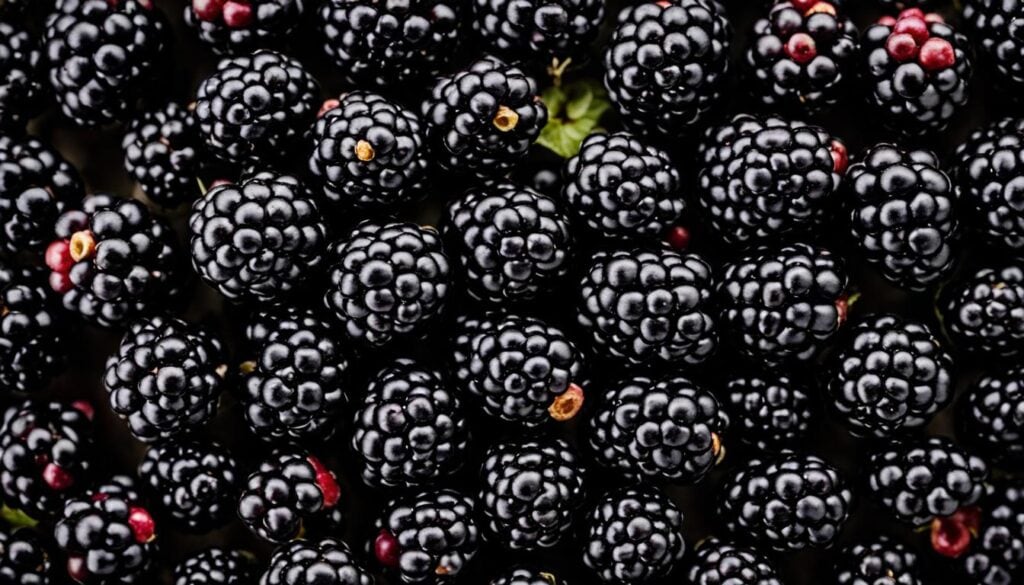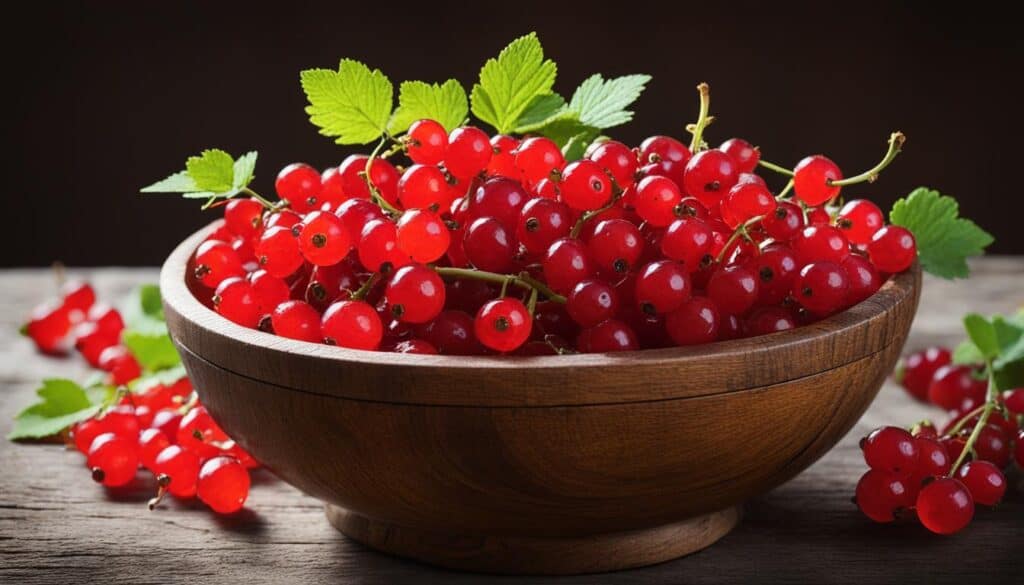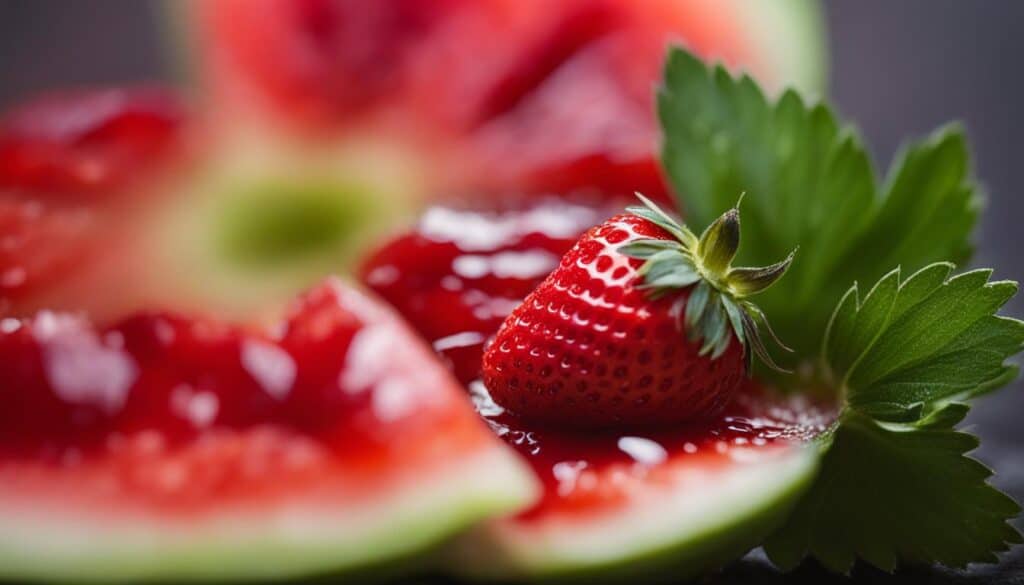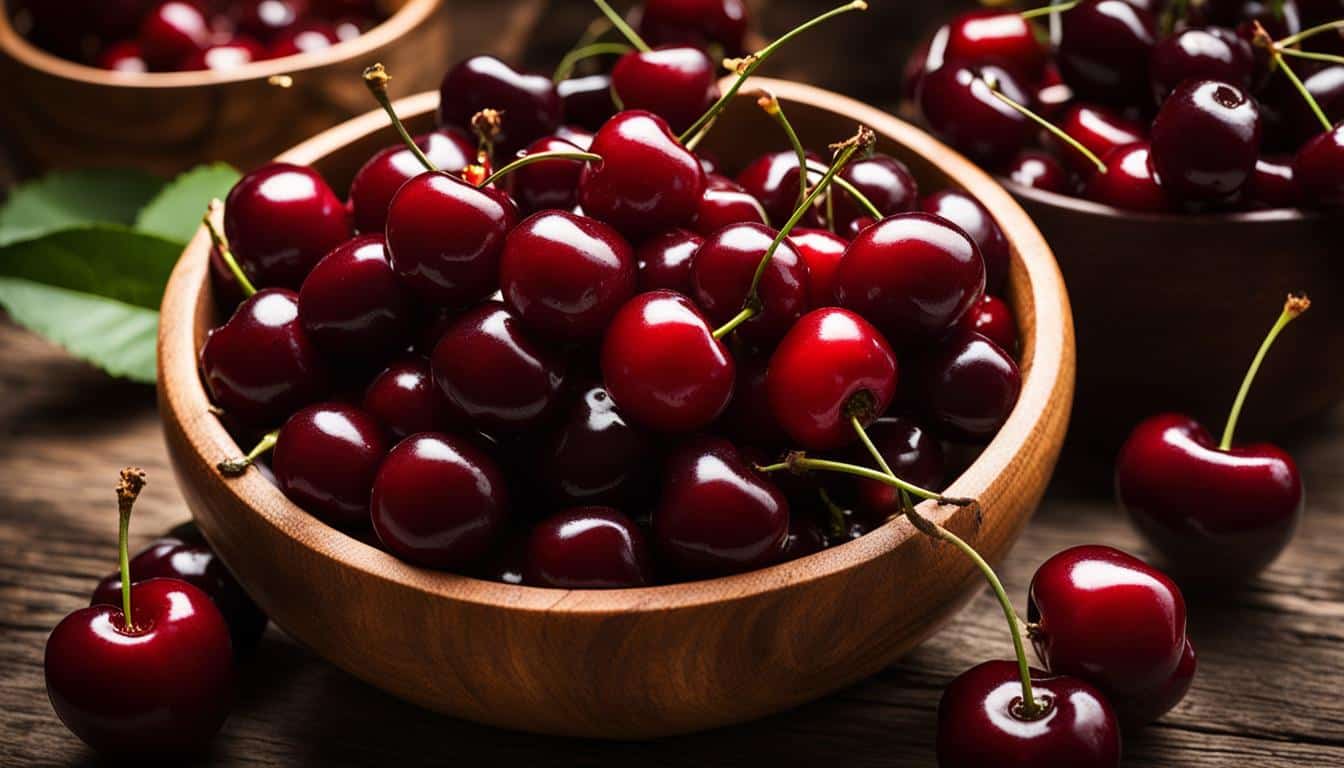Pomegranates are loved for their vibrant hue and delicious, sour flavor. But if you’re looking for alternatives, there are several fruits that can provide a similar rich flavor and health benefits. In this article, I’ll explore the best substitutes for pomegranate in recipes, including cranberries, cherries, blackberries, raspberries, red currants, blood oranges, strawberries, blueberries, and mulberries.
Key Takeaways:
- Cranberries, cherries, blackberries, raspberries, red currants, blood oranges, strawberries, blueberries, and mulberries are great alternatives to pomegranate in recipes.
- These fruits provide a similar taste and can be used in both sweet and savory dishes.
- Experiment with these substitutes to add flavor and nutrition to your meals.
- Don’t hesitate to try these alternatives if you can’t find pomegranates, as they can be a refreshing addition to your recipes.
- Explore different ways to incorporate these fruits into salads, sauces, drinks, and more.
What are Pomegranates?
Pomegranates are apple-sized fruits that have a leathery, deep crimson to pinkish-yellow skin. They contain hundreds of delicious, vitamin-packed arils. Pomegranates are popular in Middle Eastern and Mediterranean cuisines and are known for their anti-inflammatory and anticancer properties. They are versatile fruits that can be used in salads, sauces, drinks, and traditional therapies.
When you think of pomegranates, you might envision their vibrant red color and unique flavor. But there’s so much more to these fruits than meets the eye. Pomegranates are not only delicious but also packed with health benefits. They are a great source of vitamins, minerals, and antioxidants, making them a valuable addition to your diet.
Rich in vitamin C, pomegranates can boost your immune system and promote healthy skin. They are also a good source of fiber, which can aid in digestion and promote satiety. Pomegranates are low in calories and fat, making them a guilt-free option for those watching their weight.
The arils of pomegranates are bursting with flavor, balancing sweet and tart notes. They can add a refreshing and tangy twist to your dishes. Pomegranate juice, often used as a natural food coloring and flavoring, can enhance the taste of beverages, desserts, and sauces.
Aside from their culinary uses, pomegranates have been used for centuries in traditional medicine. They have anti-inflammatory properties, which can help reduce inflammation in the body and alleviate symptoms of chronic conditions such as arthritis. Studies have also shown that pomegranates may have anticancer effects, potentially inhibiting the growth of certain types of cancer cells.
So whether you enjoy the juicy arils on their own, sprinkle them on salads, or use them as a garnish for your favorite dishes, pomegranates are a versatile fruit that can elevate both the flavor and nutritional value of your meals.
Pomegranate Health Benefits
| Health Benefit | Description |
|---|---|
| Rich in antioxidants | Pomegranates are packed with antioxidants that can help protect cells from damage caused by harmful free radicals. |
| Boosts heart health | The high levels of antioxidants and anti-inflammatory properties in pomegranates can help reduce the risk of heart disease. |
| Supports digestion | Pomegranates are a good source of dietary fiber, which can aid in digestion and prevent constipation. |
| Improves skin health | The vitamin C and antioxidants in pomegranates can help promote collagen production and protect the skin from damage. |
| May have anticancer effects | Some studies suggest that pomegranates may have anticancer effects, potentially inhibiting the growth of certain cancer cells. |
Cranberries
When it comes to finding a substitute for pomegranates, cranberries are an excellent choice. Known for their sour taste, cranberries can add a tangy element to any dish or drink. Whether you’re making cranberry sauce, cocktails, juices, smoothies, salads, or sauces, cranberries offer a similar tartness and flavor to pomegranates.
If you don’t have fresh pomegranate arils on hand, dried cranberries can also be a viable alternative. They retain their signature tartness and can be easily incorporated into various recipes.
“Cranberries are a versatile fruit that can be used in a wide range of dishes. From the classic cranberry sauce on Thanksgiving to refreshing cranberry cocktails, these tart berries can add a burst of flavor to your culinary creations.”
Not only do cranberries provide a substitute for pomegranates, but they also offer their own unique health benefits. Rich in antioxidants and vitamin C, cranberries are known for their potential to prevent urinary tract infections and promote overall bladder health.
When it comes to using cranberries as a pomegranate substitute, let your creativity run wild. Experiment with adding cranberries to your favorite recipes, and discover the delightful sourness they bring.
Cranberry Recipe Inspiration
Here are a few ideas to get you started:
- Create a tangy cranberry cocktail by muddling fresh cranberries with your favorite spirits and a splash of citrus.
- Whip up a refreshing cranberry juice by blending cranberries with water and adding a touch of sweetness.
- Add dried cranberries to salads for an extra burst of flavor and texture.
- Incorporate cranberries into your morning smoothies for a tangy twist.
- Use cranberry sauce as a tasty condiment for roasted meats or as a filling for pastries and desserts.
| Cranberry Nutrients | Amount (per 1 cup, raw) |
|---|---|
| Calories | 46 |
| Carbohydrates | 12 grams |
| Fiber | 4 grams |
| Vitamin C | 13 milligrams |
| Vitamin E | 1.2 milligrams |
| Vitamin K | 5 micrograms |
| Potassium | 85 milligrams |
Cherries
When it comes to finding a substitute for pomegranates, cherries can be a delightful option. With their sweet and sour flavor profile, cherries can provide a similar taste experience. Whether you’re making salads, pies, or garnishes, cherries can add a burst of flavor and visual appeal to your dishes.
If you’re unable to find pomegranate seeds, vibrant red cherry juice can serve as an excellent substitute. The juice can be used to enhance the taste of various recipes, bringing a sweet and tangy note similar to pomegranates.
Blackberries
Blackberries are a delicious and versatile fruit that can be used as a substitute for pomegranates. They have a sweet and tart flavor, similar to pomegranates, making them a great option for various dishes. Whether you’re making a refreshing smoothie or a decadent dessert, blackberries can add a burst of flavor and nutrition.
One popular way to incorporate blackberries into your recipes is by making smoothies. Blend fresh blackberries with your favorite fruits and liquids for a refreshing and nutritious beverage. You can also add a handful of blackberries to your favorite salad for a pop of color and flavor.
If you’re craving something sweet, blackberries can be used in a wide range of desserts. They can be baked into pies, tarts, or cobblers, creating a delicious treat that combines sweet and tart flavors. Blackberry sorbet or ice cream is another delightful option for satisfying your sweet tooth.
Now, let me share a recipe that highlights the sweet and tart flavors of blackberries: Blackberry Cobbler. This classic dessert is easy to make and perfect for showcasing the natural sweetness of blackberries.
Recipe: Blackberry Cobbler
- Preheat your oven to 375°F (190°C) and grease a baking dish.
- In a bowl, mix together 4 cups of fresh blackberries, 3/4 cup of granulated sugar, 2 tablespoons of cornstarch, and a squeeze of lemon juice.
- Pour the blackberry mixture into the greased baking dish.
- In a separate bowl, combine 1 cup of all-purpose flour, 1/2 cup of granulated sugar, 1 teaspoon of baking powder, and a pinch of salt.
- Add 1/2 cup of melted butter and 1/2 cup of milk to the dry ingredients. Mix until just combined.
- Drop spoonfuls of the batter onto the blackberry mixture, covering it as evenly as possible.
- Bake in the preheated oven for 40-45 minutes, or until the crust is golden brown and the blackberries are bubbling.
- Remove from the oven and let it cool for a few minutes before serving. Serve warm with a scoop of vanilla ice cream, if desired.
Enjoy this blackberry cobbler as a delightful alternative to pomegranate-based desserts. The combination of sweet and tart blackberries with the buttery crust is sure to please your taste buds.

Raspberries
Raspberries provide both sweetness and tanginess, making them a great substitute for pomegranate seeds. Their vibrant red color and burst of flavor make them a delightful addition to a variety of dishes. Whether you’re looking to add a fruity twist to salads, yogurt, jams, or oatmeal, raspberries are a versatile ingredient that can elevate the taste and visual appeal of your meals.
If you’ve run out of pomegranate juice, don’t worry! You can use frozen raspberries to create a delicious alternative. Simply add them to your smoothies for a refreshing and tangy twist.
To showcase the versatility of raspberries as a pomegranate substitute, here are some ideas for incorporating them into different dishes:
“Raspberries add a burst of sweetness and tanginess to my salads. I love the vibrant color they bring to the dish, making it visually appealing and full of flavor.”
Salads:
Add a handful of fresh raspberries to your favorite salad greens for a pop of color and a delightful sweetness. The tanginess of the raspberries pairs well with the crispness of the vegetables, creating a refreshing balance of flavors.
Yogurt:
Top your yogurt with a handful of raspberries for a naturally sweet and tangy twist. The juicy berries make for a delectable combination with creamy yogurt, adding both flavor and texture to your morning or afternoon snack.
Jams:
Make a homemade raspberry jam by combining raspberries with sugar and cooking them down into a thick and luscious spread. Enjoy it slathered on toast, scones, or as a filling for pastries and cakes. The natural sweetness of raspberries makes for a delectable jam with a hint of tanginess.
Oatmeal:
Sprinkle some fresh or frozen raspberries atop your warm bowl of oatmeal to add a burst of fruity goodness. The sweet and tangy flavor of the raspberries will complement the nuttiness of the oats, creating a satisfying and flavorful breakfast.

With their natural sweetness and tanginess, raspberries are a fantastic substitute for pomegranate seeds. Whether you’re looking to enhance the flavor of your salads, yogurt, jams, or oatmeal, raspberries offer a burst of fruity goodness that will elevate your dishes. Explore the versatility of raspberries as a pomegranate substitute and discover the delicious ways you can incorporate them into your favorite recipes.
Red Currants
Red currants are a fantastic substitute for pomegranates in recipes. These tiny berries have a sour taste that is reminiscent of pomegranates, making them a great option when you can’t find the real deal. Red currants can be used in a variety of ways, from sauces and jams to drinks and desserts.
One of the great things about red currants is their versatility in the kitchen. You can use them to make tangy sauces that pair perfectly with savory dishes. Their bright red color also adds a beautiful touch to salads, making them an eye-catching addition to any plate.
If you enjoy making homemade jams or jellies, red currants can be used as a delicious substitute for pomegranate seeds. Their tartness adds depth of flavor to your preserves, creating a unique twist on traditional recipes.
In addition to sauces and jams, red currants can also be used to create refreshing drinks. Their sour taste adds a zing to cocktails, mocktails, and fruit-infused water. Simply muddle the berries with a bit of sugar, add your preferred liquid, and enjoy a refreshing beverage.
Whether you’re looking to experiment with new flavors or simply can’t find pomegranates at your local grocery store, red currants are a fantastic alternative. Their sour taste, versatility in sauces and jams, and ability to enhance both sweet and savory dishes make them a great substitute in any recipe.

Red currants are a fantastic substitute for pomegranates in sauces, jams, and drinks. Their sour taste and vibrant color make them a versatile and eye-catching addition to your recipes. Whether you’re making a tangy sauce or a refreshing cocktail, red currants can provide the same burst of flavor as pomegranate seeds. Don’t hesitate to explore the possibilities of red currants in your cooking!
Blood Oranges
Blood oranges are a fantastic substitute for pomegranates in various culinary creations. These citrus fruits have a deep red color that resembles the vibrant hue of pomegranates. Not only are blood oranges visually appealing, but they also offer a sweet and acidic flavor profile that is similar to their pomegranate counterparts.
One of the versatile ways to incorporate blood oranges as a pomegranate substitute is in salads. The deep red segments of the fruit add a pop of color and a burst of tangy sweetness to any salad. Additionally, blood oranges can be used to create delicious and refreshing beverages, such as juices, mocktails, or infused water.
“The sweet and acidic taste of blood oranges makes them an excellent choice for creating vibrant and flavorful beverages.”
Another great way to utilize blood oranges is as garnishes. Whether you’re garnishing a cocktail, a dessert, or even a savory dish, the deep red color of blood oranges adds an elegant touch to any presentation. Their tangy-sweet flavor enhances the overall taste and aesthetics of the dish.

| Usage | Recipes |
|---|---|
| Salads | Blood orange and arugula salad |
| Beverages | Blood orange mocktail |
| Garnishes | Blood orange-infused flourless chocolate cake |
Strawberries
Sweet and luscious strawberries can be a great substitute for pomegranates. They are a versatile fruit that can be used in smoothies, desserts, oatmeal, and yogurt toppings. Add strawberries to your recipes for a burst of flavor similar to pomegranate.

“Strawberries are not only delicious but also packed with vitamins and antioxidants. They add a natural sweetness to any dish and are perfect for refreshing smoothies or indulgent desserts.” – Chef Alison Thompson
Blueberries
Sweet and little blueberries can instantly elevate your meals. They are a great substitute for pomegranate seeds in baked goods, pies, and salads. Add blueberries to your recipes for a touch of sweetness and a burst of flavor.
If you’re looking to add a pop of color and a delightful taste to your dishes, blueberries are an excellent choice. These small and juicy berries are not only delicious but also packed with nutritional benefits. Whether you’re baking a pie, making a salad, or creating a flavorful sauce, blueberries can be a versatile and tasty substitute for pomegranate seeds.
Blueberries are known for their natural sweetness, making them a preferred ingredient in various baked goods. Their vibrant blue color can also add visual appeal to your desserts. Try incorporating blueberries into muffins, pancakes, or tarts for a burst of flavor and a delightful burst of sweetness.
Furthermore, blueberries can enhance the taste and texture of your savory meals. Sprinkle them on top of salads to add a refreshing twist and a touch of sweetness. You can also experiment with incorporating blueberries into salsas or chutneys for a unique and flavorful accompaniment to grilled meats or roasted vegetables.
Blueberries in Baked Goods
Blueberries work particularly well in baked goods due to their natural sweetness and ability to retain their shape during the baking process. Here are a few ideas:
- Add blueberries to your favorite muffin or scone recipe for a burst of fruity goodness.
- Fold blueberries into pancake or waffle batter for a delightful morning treat.
- Create a classic blueberry pie with a buttery crust and a sweet and tangy filling.
Blueberries in Salads
Blueberries can add a refreshing touch to salads, complementing a variety of ingredients. Consider the following combinations:
- Pair blueberries with mixed greens, goat cheese, and candied pecans for a refreshing summer salad.
- Add blueberries to a spinach salad with feta cheese, walnuts, and a balsamic vinaigrette for a burst of flavor.
- Create a fruit salad with blueberries, strawberries, and watermelon for a colorful and refreshing side dish.
No matter how you choose to incorporate blueberries into your recipes, their sweet and slightly tangy flavor will surely enhance your culinary creations. Enjoy the burst of flavor and the vibrant color that blueberries bring to your dishes!
Mulberries
If you’re looking for a sweet and tiny substitute for pomegranates, mulberries are an excellent choice. These small berries offer a similar taste and can be used in a variety of culinary creations.
One of the best ways to enjoy mulberries is by adding them to smoothies. Their natural sweetness pairs well with other fruits and creates a delicious and refreshing blend. The tiny size of mulberries also makes them ideal for sprinkling on top of baked foods like muffins or incorporating into yogurt parfaits.
Not only are mulberries a wonderful addition to smoothies and baked goods, but they can also be used to make flavorful preserves. Their sweet and tangy taste adds a unique twist to homemade jams and jellies, making them a delightful alternative to traditional pomegranate preserves.
Health Benefits of Mulberries
Mulberries are not only delicious but also packed with nutritional benefits. They are a rich source of antioxidants, vitamins, and minerals, including vitamin C, iron, and potassium. These nutrients contribute to a healthy immune system, improved digestion, and overall well-being.
Additionally, mulberries have been associated with several health benefits, such as reduced inflammation, improved heart health, and enhanced brain function. Their high fiber content can also support healthy digestion and weight management.
So, if you’re in need of a pomegranate substitute, give mulberries a try. They offer a sweet and tiny burst of flavor to smoothies, baked goods, and preserves, while also providing numerous health benefits. Experiment with mulberries in your recipes and enjoy the unique taste they bring, reminiscent of pomegranates.
Conclusion
In conclusion, if you’re looking for alternatives to pomegranate, there are plenty of flavorful substitutes available. Cranberries, cherries, blackberries, raspberries, red currants, blood oranges, strawberries, blueberries, and mulberries can all be used as excellent replacements in both sweet and savory recipes. These fruits not only provide a similar taste, but also offer a range of health benefits.
Whether you’re making salads, sauces, cocktails, smoothies, or desserts, these alternatives for pomegranate can add a burst of flavor and nutrition to your dishes. In addition to their delicious taste, these fruits also bring vibrant colors and visual appeal to your meals.
So, the next time you can’t find pomegranates at the store, don’t worry! Experiment with these substitution options and explore the wonderful world of cranberries, cherries, blackberries, raspberries, red currants, blood oranges, strawberries, blueberries, and mulberries. You might just discover a new favorite fruit!
FAQ
What are the best substitutes for pomegranate in recipes?
Cranberries, cherries, blackberries, raspberries, red currants, blood oranges, strawberries, blueberries, and mulberries are all excellent substitutes for pomegranate in recipes.
Can cranberries be used as a substitute for pomegranate?
Yes, cranberries can be a great substitute for pomegranates due to their sour taste. They can be used in cranberry sauce, cocktails, juices, smoothies, salads, and sauces.
What can cherries be substituted with in recipes instead of pomegranates?
Cherries can provide a similar taste to pomegranates as they are both sweet and sour. They can be used in a variety of dishes, including salads, pies, and garnishes.
Are blackberries a suitable alternative for pomegranates in cooking?
Yes, blackberries have a sweet and tart flavor, making them a great substitute for pomegranates. They can be used in a variety of dishes, from smoothies to desserts.
Can raspberries be used as a substitute for pomegranate seeds?
Yes, raspberries provide both sweetness and tanginess, making them a great substitute for pomegranate seeds. They can be used in salads, yogurt, jams, and oatmeal.
What are some suitable substitutes for pomegranate seeds in recipes?
Red currants are sour, tiny berries that taste similar to pomegranates. They can be used as a substitute for pomegranate seeds in sauces, jams, and drinks.
Can blood oranges be used as a substitute for pomegranate?
Yes, blood oranges have a deep red color and a sweet, acidic flavor similar to pomegranates. They can be used as a substitute in salads, beverages, and garnishes.
Are strawberries a good alternative to pomegranates in cooking?
Yes, sweet and luscious strawberries can be a great substitute for pomegranates. They can be used in smoothies, desserts, oatmeal, and yogurt toppings.
Can blueberries be used as a substitute for pomegranate seeds in recipes?
Yes, sweet and little blueberries can be a great substitute for pomegranate seeds in baked goods, pies, and salads.
What can be used as a substitute for pomegranates in recipes?
Mulberries are sweet, tiny berries that have a similar taste to pomegranates. They can be used in smoothies, baked goods, and preserves as a substitute.





Leave a Reply